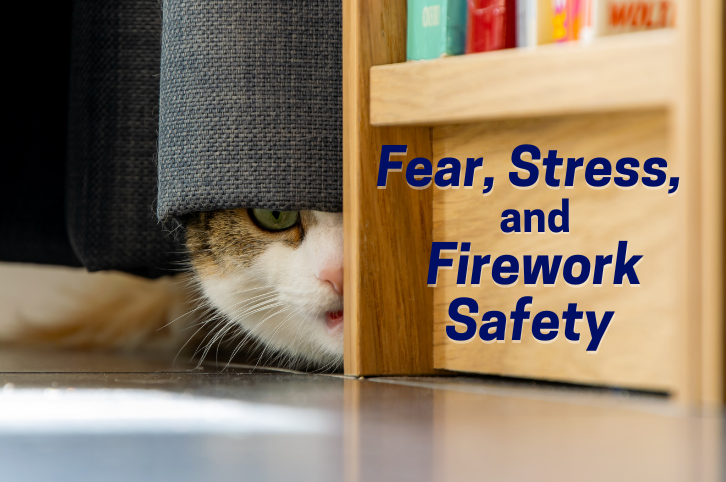Does your pet tremble at the sound of festive fireworks? Firework fears are a serious problem for our furry friends. During the summer months, firework celebrations are more common, and it’s essential to take certain precautions to keep your pet safe. At Cloquet Animal Hospital, we are here to help you understand your pet’s firework fears and provide tips to help reduce their anxiety.
Why is My Pet Afraid of Fireworks?
Sudden loud noises, such as fireworks, can be startling to a pet who doesn’t understand what is happening. This is often referred to as a noise phobia and can occur for various reasons.
Some pets develop noise phobias due to a specific traumatizing event. However, other pets can develop this fear due to repeated exposure to frightening noise.
The severity of noise phobias can vary greatly. Some pets only experience mild fear symptoms such as excessive panting or shaking. However, others experience more severe panic. These pets may run and hide to get away from the noise. They may also make attempts to escape or exhibit destructive behavior.
Reducing Your Pet’s Fear
Your pet’s fear of fireworks can seriously affect their physical and mental health. Because of this, it’s important to take steps to reduce your pet’s stress and anxiety around the loud noise.
- Be Prepared
The best way to reduce your pet’s fear is to start early. Be mindful of certain holidays and events when fireworks may take place. Make arrangements to reduce your pet’s exposure and prevent their fear before it even begins.
- Create a Quiet Space
To reduce your pet’s exposure to firework noise, consider setting up a quiet space where your pet can feel safe. Bathrooms are great for protecting your pet from exterior windows and doors where the noise is the loudest. You can also use music to help drown out the sound and provide some distraction.
- Consider a Calming Agent
For pets with severe anxiety, calming agents can help reduce firework fear and stress. Some calming agents are available as supplements or treats. However, calming medications require a veterinary prescription. Calming agents are most effective when given ahead of a noise event and used in combination with other calming techniques.
Additional Safety Tips
When it comes to firework safety, there are some additional precautions you should consider for your pet. Firework blasts and debris can cause your pet harm, and it’s best to keep your furry friend inside.
Another major concern regarding your pet’s safety is the potential for escape. Pets who are scared may try to bolt or hide to get away from the noise. Unfortunately, this leads to many pets being separated from their owners or lost during firework celebrations.
To keep your pet safe, take them inside before the fireworks begin and ensure all windows and doors are closed. It’s also important to ensure your pet is wearing an ID tag and their microchip information is up to date.
Final Thoughts
Fireworks can be a stressful experience for our furry friends. Remember to take precautions to keep your pet safe and help reduce their fear.
If you have additional questions about firework safety or would like to discuss your pet’s fears, please give us a call at 218-879-9280. Stay safe and enjoy your summer holidays!
Image credit:

